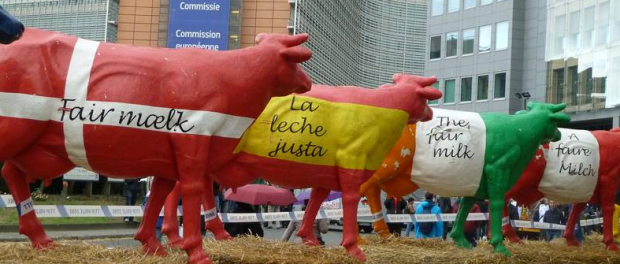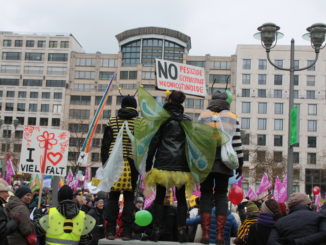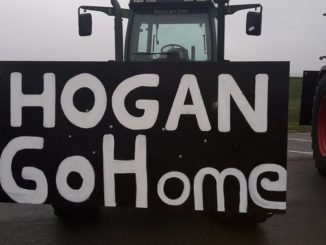
Following ongoing protests around Europe, including one involving almost 1500 tractors in Brussels itself yesterday, the Commission has announced a support package worth €500 million.
The Commission claims “the focus of this response is threefold: (1) addressing the cash-flow difficulties farmers are facing, (2) stabilising markets and (3) addressing the functioning of the supply chain.”
Further discussions are to be held 14-15 September at the informal Agricultural Council. “These are intended to address some of the practical implementation questions raised by the Commission’s proposals but the issue of raising the intervention price for dairy products may still not be finally settled” according to political economist Alan Matthews.
The context for decision-making has been fraught, with many different perspectives even within the protesting dairy sector itself. According to Vieuws: “the demonstrators’ demands included early direct payments to help farmers with their liquidity problems; a fund directed at marketing agricultural products outside the EU; a review of the intervention price at which farmers can sell their stock to the EU; and mechanisms to stabilise the price of milk and pork. Some are also calling for temporary milk quotas to be reintroduced: a move they say will reduce supply and bring up prices.”
Alan Matthews select the key measures from the Commission factsheet, which lists all measures.
• Provision of direct targeted aid to the dairy sector significantly greater than the amount…that was provided during the 2009 milk crisis…
• Member states to be able to advance up to 70% of direct payments and up to 85% of area- and animal-based rural development payments from mid-October (up from 50% and 75%, respectively, currently allowed;
• Tapping into the new European Fund for Strategic Investments to attract more capital into the industry. An idea specifically mentioned is to design a financial instrument where repayment schedules are linked to commodity price developments;
• A new private storage scheme for milk products, with higher payments and longer storage periods;
• Reopening of private storage for pigmeat;
• Additional funding for promotion of dairy products and pigmeat in the EU and third countries;
• Further intensification of efforts to tackle non tariff barriers in third countries;
• Strengthening of the Milk Market Observatory and the development of a similar tool for pigmeat;
• Establishment of a High Level Group to improve the functioning of the supply chain with possible improvements for farmers;
• Better use of the “milk package” and the preparation for 2016 of the report on the functioning of the milk package initially scheduled for 2018;
• Agreement to push for an early conclusion on the Commission’s proposal to merge the school schemes for fruit and vegetable and milk.
• Recognition of the possibility to mobilise national funding under the ‘de minimis’ rules as well as to provide state aids in addition to funding under rural development programmes.
However the key demand of organisations like the European Milk Board (EMB) to curb production in the context of the Russian embargo and declining demand in China has been ignored.
“The EU milk market is flooded, prices are plummeting. In some countries they are approaching 20 cents. Unless production is reduced, the market will carry on deteriorating at a pace”, said the EMB President Romuald Schaber yesterday, who stressed the necessity for a cut in production throughout the EU.
“The politicians have been hell-bent on a massive export drive with an increase in volumes throughout the EU. That has failed miserably, and now has to be rectified on the EU level as well. Individual nations cannot hope to come up with any lasting solutions on their own”, Schaber said.
Reacting to the announcement, the Executive Committee of the EMB said. “Farmers from all over Europe did not take to the streets for subsidies, but for a crisis-management instrument, to solve the root cause of the problem – overproduction in the European market.”
The EMB earmarked four key measures for comment:
-Programme for private storage to be continued: The past months have shown that this measure has practically no effect. In spite of private warehousing, milk prices are still stuck in a downward spiral.
– Promoting the sale of milk products within the EU and in third countries, inter alia by expanding free trade agreements: Clearly a shot in the dark by policymakers, not appropriate for European milk producers and which also poses the danger of negatively affecting markets in third countries.
– Early payment of direct aid: In the short term, this measure could help farmers and provide immediate relief. However, production volumes should be reduced and adapted to the market situation at the same time, in order to bring some stability to the milk sector.
– Strengthening the role of the Milk Market Observatory (MMO): This must lead to the creation of a fully functioning observatory. In other words, the MMO must observe but should also be equipped to react to market risks. This would include adjusting production volumes in times of crisis.
The core aim of the EMB is to the use of a Market Responsibility Programme (MRP). They state “excessive volume of milk must be reduced in times of crisis using the Market Responsibility Programme (MRP)”. They also focus on “raising the intervention price only whilst simultaneously reducing the volume” and undertaking “a proper analysis of the situation” in the context of the Russian embargo and the decrease in exports to China, and the effect of these global trade realities on production volumes.
Others too have been critical of the package. Sinn Féin (GNU, Ireland) MEP and member of the EU Parliaments Agriculture & Rural Affairs Committee, Matt Carthy has described the package of measures announced on Monday by the Commission as an insult to Farmers. Carthy accused the commission of having missed an important opportunity to stabilise farm incomes and said that the lack of comprehensive action could mean that many farmers will be concerned for their futures in the sector.
“Farmers across the board will be bitterly disappointed by the commission’s position but Dairy farmers will be especially bewildered. They had a right to expect real action especially in the area of intervention price. They are supplying below the cost of production in a scenario that is simply not sustainable. The EU has left itself in the position that the only meaningful input it can have in the market is through intervention prices. Yet the current intervention price of 21c is well below the cost of production and bizarrely the commission has avoided making the decision that could have had a positive effect by increasing the price to 25c” Carthy said.
Alan Matthews however, feels “the Commission’s proposals yesterday are an appropriate response to the real difficulties faced by producers at the present time” claiming that dairy farmers have learned little since the very similar 2009 crisis.
There is he suggests a concern that if the dairy industry expects “the taxpayer will come to their assistance every time there is a cyclical drop in prices” they will have “no incentive to act to put their own house in order.”
Previous measures as a response to the 2009 crisis have been repeated again in this crisis response. Matthews points to where the Commission note that “take-up has been slow in some regions because market conditions have been relatively favourable since 2012.” These measures were, then as now, “aimed at giving producers a stronger position in the dairy supply chain, such as written contracts, collective bargaining, encouraging Producer Organisations”.
“Another example is the lack of interest in the income stabilisation tool in the recently-submitted Rural Development Programmes, where only a few member states have programmed this tool.
Finally, we are to have a High-Level Group to look at the need for futures markets and other risk management instruments seven years after it was blindingly clear that quotas would be eliminated in 2015 and that price volatility would have to be managed.”
Matthews summarises by stating “in other words, why bother to prepare for a rainy day when we know that we can always tap into the EU budget when times get tough?”
Link to the comprehensive list of measures
Link to full speech and market analysis
All ARC2020 articles on the #MilkCrisis





